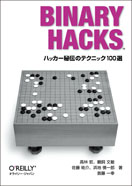About the Book
Binary Hacks from O'Reilly Japan is a book about low-level programming on GNU/Linux systems. The goal of the book is to offer useful but not necessarily very well-known techniques as many as we can to readers.
Book Data
 Enlarge the image |
|
Table of Contents
Chapter 1. Introduction
- 1. Introduction to Binary Hacks
- 2. Terminology of Binary Hacks
- 3. Using "file" to tell file types
- 4. Using "od" to dump binary files
Chapter 2. Object Files Hacks
- 5. Introduction to ELF
- 6. Static libraries and dynamic libraries
- 7. Using "ldd" to check dependencies of shared libraries
- 8. Using "readelf" to see information of ELF files
- 9. Using "objdump" to dump object files
- 10. Using "objdump" to disassemble object files
- 11. Using "objcopy" to embed data in executables
- 12. Using "nm" to see lists of symbols in object files
- 13. Using "strings" to extract strings from binary files
- 14. Using "c++filt" to demangle C++ symbols
- 15. Using "addr2line" to get file names and line numbers by addresses
- 16. Using "strip" to delete symbols from object files
- 17. Using "ar" to modify static libraries
- 18. How to link C and C++ programs
- 19. How to avoid symbol collision issues
- 20. Why PIC code is used for shared libraries on GNU/Linux systems
- 21. Using "statifier" to create pseudo static executables from dynamic executables
Chapter 3. GNU Programming Hacks
- 22. Introduction to GCC extensions
- 23. Using inline assembler with GCC
- 24. Using GCC's builtin functions for optimization
- 25. Writing "Hello World" without using glibc
- 26. Using TLS (Thread Local Storage)
- 27. Switching glibc's internal libraries by system capabilities
- 28. Changing behavior of programs by linked libraries
- 29. Reducing exported symbols of libraries
- 30. Using versioned symbols to manage compatibility
- 31. Calling functions before main()
- 32. How GCC generates trampoline code at runtime
- 33. Allowing and disallowing executable flags of code on stacks
- 34. Running code on heaps
- 35. Creating PIE (Position Independent Executable)
- 36. Writing synchronized methods in C++
- 37. Creating singletons in C++
- 38. Understanding g++'s exceptions (throw)
- 39. Understanding g++'s exceptions (SjLj)
- 40. Understanding g++'s exceptions (DWARF2)
- 41. Understanding runtime cost of g++'s exceptions
Chapter 4. Secure Programming Hacks
- 42. Introduction to GCC secure programming
- 43. Using "-ftrapv" to detect integer overflows
- 44. Using "Mudflap" to detect buffer overflows
- 45. Using "-D_FORTIFY_SOURCE" to detect buffer overflows
- 46. Using "-fstack-protector" to protect stacks
- 47. Why you should use unsigned constants to do bitmask
- 48. Why big shift operations are dangerous
- 49. Why you should care difference between 0 and NULL on 64-bit systems
- 50. Thread-safe functions defined by POSIX
- 51. Writing signal handlers in a safe manner
- 52. Using "sigwait" to process async signals synchronously
- 53. Using "sigsafe" to write signal processing safely
- 54. Using "Valgrind" to detect memory leaks
- 55. Using "Valgrind" to detect invalid memory access
- 56. Using "Helgrind" to debug multi-threaded programs
- 57. Using "fakeroot" to run programs with fake root privilege
Chapter 5. Runtime Hacks
- 58. How programs reach main()
- 59. How system calls are called
- 60. Using "LD_PRELOAD" to switch shared libraries
- 61. Using "LD_PRELOAD" to wrap existing functions
- 62. Using "dlopen" to do dynamic linking
- 63. Showing backtraces with C programs
- 64. Checking running process's absolute path
- 65. Checking loaded shared libraries of running programs
- 66. Checking memory maps of running programs
- 67. Using "libbfd" to list symbols
- 68. Demangling C++ symbols at runtime
- 69. Using "ffcall" to call functions with dynamic signatures
- 70. Using "libdwarf" to get debug information
- 71. Using "dumper" to pretty-print struct variables
- 72. How to load object files yourself
- 73. Using "libunwind" to control call chains
- 74. Using "GNU lightning" to generate code in a portable manner
- 75. Getting addresses of stacks
- 76. Using "sigaltstack" to handle stack overflows
- 77. Hooking entering and exiting of functions
- 78. Modifying contexts of programs in signal handlers
- 79. Getting values of program counters
- 80. Rewriting your programs at runtime
- 81. Using "SIGSEGV" to validate accessibility of addresses
- 82. Using "strace" to trace system calls
- 83. Using "ltrace" to trace function calls in shared libraries
- 84. Using "Jockey" to record and replay programs
- 85. Using "prelink" to improve programs starting up time
- 86. Using 'livepatch" to patch running programs
Chapter 6. Profilers and Debuggers Hacks
- 87. Using "gprof" to profile programs
- 88. Using "sysprof" to profile systems very easily
- 89. Using "oprofile" to profile systems
- 90. Using "GDB" to control running programs
- 91. Using debugging support of hardware
- 92. Setting break points in your C programs
Chapter 7. Misc Hacks
- 93. How Boehm GC works
- 94. Why you should be careful about memory ordering of processors
- 95. Light-weight concurrent processing with PCL (Portable Coroutine Library)
- 96. Counting clock counts of CPUs
- 97. How floating numbers are expressed in bits
- 98. What's special about x86's floating numbers instructions
- 99. Raising signals for operations resulting infinite or NAN.
- 100. Further reading
